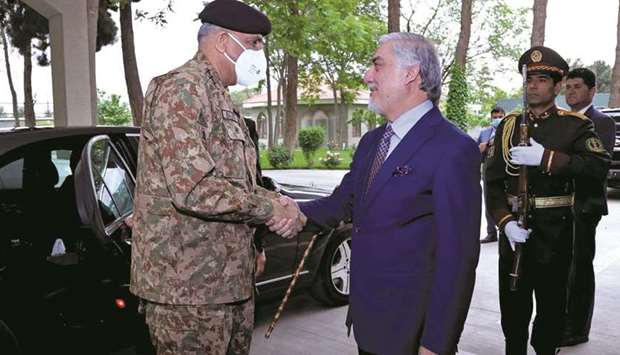• Taliban and Afghan forces declare Eid al-Fitr holiday ceasefire
The Pakistan army chief offered Islamabad’s support for the Afghanistan peace process in a meeting with President Ashraf Ghani in Kabul yesterday amid growing violence as the United States withdraws its troops.
Britain’s chief of defence staff also attended the meeting.
Pakistan is a key player in moves to resolve the conflict between the Western-backed government and the Taliban insurgents.
In the past, Islamabad has been accused of harbouring the Taliban but in recent years Washington and other Western powers have acknowledged its efforts to push the militant group to take part in peace talks.
Pakistan Army Chief of Staff General Qamar Javed Bajwa reiterated to Ghani that “a peaceful Afghanistan means a peaceful region in general and a peaceful Pakistan in particular”, a Pakistani military statement said.
“We will always support ‘Afghan-led, Afghan-owned’ Peace Process based on mutual consensus of all stakeholders,” it said.
Bajwa was accompanied by British Chief of Defence Staff General Nicholas Patrick Carter and Pakistan’s spy chief Lieutenant-General Faiz Hamid.
Britain still has troops in Afghanistan in a war that started with the overthrow of a Taliban government following the 2001 attacks by religious militants in the United States.
In recent weeks, Pakistan has been negotiating with the insurgents to try to get them to commit to a ceasefire, Taliban and diplomatic sources have told Reuters.
Pakistan is also trying to persuade them to agree to an extension of the US-Taliban agreement which stipulated US and other foreign forces should withdraw by May and to continue to take part in planned peace talks in Turkey.
However, violence has risen starkly in recent weeks as the US forces pull out.
The Taliban and Afghan government have meanwhile declared a three-day ceasefire for this week’s Eid al-Fitr holiday.
Violence has soared since May 1 – the deadline missed by the United States to withdraw the last of its troops – and while the Taliban have avoided engaging American forces, attacks against government and civilian targets have not stopped.
In the latest, the interior ministry said yesterday that at least 11 people were killed by a bomb that struck a bus overnight in southeastern Zabul province.
That followed Saturday’s carnage outside a school in the capital Kabul when a series of bombs killed at least 50 people and wounded more than 100 – most of them young girls.
Yesterday the Taliban instructed their fighters “to halt all offensive operations against the enemy countrywide from the first till the third day of Eid”.
That was matched later in the day by Afghan President Ghani, who went further by urging the Taliban to announce a permanent truce to end the bloody war.
The Taliban and government have declared similar ceasefires in the past to mark Islamic holidays.
Kabul resident Rashed Hashimi said the Taliban should stop fighting as US forces were leaving.
“The Taliban were saying they were fighting the foreigners, but now the foreigners are leaving,” he said. “So, why are they fighting Afghans?”
Political analyst Fawad Kochi said the ceasefire was a way for the Taliban leadership to give its forces a brief respite from fighting that has intensified since the US troop withdrawal formally commenced on May 1.
“The government will try all possible channels to extend the ceasefire but the Taliban will go back to the battlefield right after the Eid,” he said. “The Taliban know that a prolonged ceasefire will split them and kill their momentum. They will never want that.”
The Taliban insist they have not carried out attacks in Kabul since February last year when they signed the deal with Washington that paved the way for peace talks and withdrawal of the remaining US troops.
But they have clashed daily with Afghan forces in the rugged countryside.

Pakistan’s Army Chief of Staff General Qamar Javed Bajwa is welcomed by Afghanistan’s High Council for National Reconciliation Chairman Abdullah Abdullah in Kabul.
